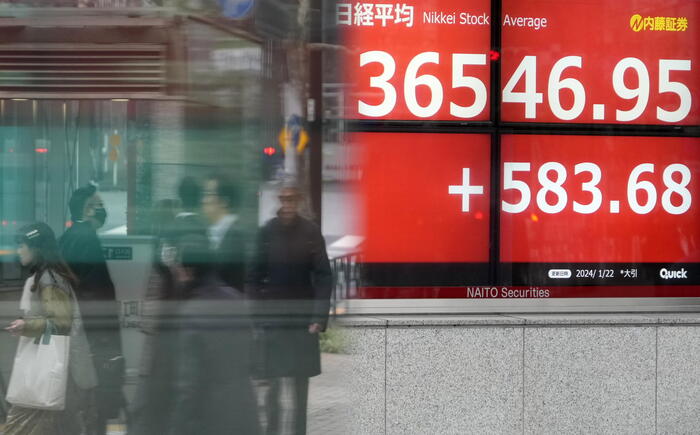The special tariffs in the trade dispute between the US and China, which came into effect on the weekend, only had a slight impact on the Tokyo stock market. The 225-value Nikkei index lost 0.3 percent. The broader Topix also lost 0.3 percent.
Among the companies that are down on the Japanese stock market in view of this escalation are those with a strong presence in China. Thus, the machine-builder Komatsu lost 0.3 percent, the robot manufacturer Fanuc 0.2 percent and the electronics manufacturer Yaskawa 1 percent. One euro was valued at $ 1.0991, barely changed to late New York trade. Already on Friday the common currency had been worth as little as it had been for more than two years.
In the trade dispute, the US and China had on Sunday as announced new penalty duties in force. Exceptions for products that are already on the way, it should not give the US Customs. US President Donald Trump again called on US companies to find suppliers outside of China. "There is no reason to buy anything from China," Trump wrote on Twitter on Sunday. America should no longer be a servant of China, he quoted an economist. Trump also reiterated his demand that all costs of the trade war be borne by China alone.
China imposes counter taxes
In response to the new US tariffs, China imposed countervailing duties of five and 10 percent on US imports. Ten percent is also levied on imports of meat, vegetables such as corn and potatoes, fruit, clothing and leather goods. Five percent is made up of soybeans, dairy products, mushrooms and chemicals.
The US and China have been fighting a trade war for over a year, slowing economic growth in both countries and globally. Trump wants to move China to punitive tariffs to conclude a comprehensive trade agreement. "The tariffs have given us an incredible negotiating position," Trump had said on Friday. "I really believe China wants a deal." The negotiations have been deadlocked for months, Trump said to be resumed this month. There is no reaction from Beijing yet.
The next escalations have already been announced: From 15 December, the US wants to put 15 percent of tariffs on other consumer goods from China worth around $ 160 billion into force. Then products such as smartphones, laptops and clothes are recorded. The announced in August punitive tariffs were originally also from Sunday to apply. But Trump took out a part of them initially, Apple CEO Tim Cook should have advised him. From December onwards, almost all imports of goods from China - in 2018 they had a value of around 540 billion dollars - punitive tariffs.
Beijing has already announced further punitive tariffs. China plans to raise additional import fees of five and ten percent from December 15, with further US taxes taking effect. Ten percent will then be charged additionally on goods from the USA such as coffee, fruit juices, wine and beer, medicines, wood and even cars. Five percent comes on cigarettes, clothing, car parts, electrical appliances and aircraft engines on it.
How does the Civey method work?
The opinion research institute Civey works with a multi-level fully automated procedure. All representative real-time surveys are played in a Germany-wide network of more than 20,000 websites ("Riversampling"), so it is not only users of SPIEGEL ONLINE interviewed. Anyone can participate in the surveys online and will be included in the representative result with their answers if they have registered. From these users, Civey draws a quoted sample that ensures that it matches the population, for example, in terms of age, gender and population density. Finally, in a third step, the results are weighted by other attendees' socio-demographic factors and attitudes to correct distortions and prevent manipulation. More information can be found in the Civey FAQ.
Why is a registration necessary?
The registration helps to weigh the answers, thus allowing a result for the surveys, which is representative of the voting population in Germany. Each participant is asked for their gender, year of birth and place of residence. After that everyone can give their opinion in further surveys on different topics.
How do the results become representative?
The answer of each participant is weighted so that the result of a survey is representative of the population. For the Sunday question and the government monitor, this population comprises the population entitled to vote in Germany. The weighting is done fully automatically on the basis of the personal details at the registration as well as the history of earlier answers of a user. More methodological details can be found in the Civey whitepaper.
Will you reach enough participants online?
Opinion polls are usually conducted by phone or online. The significance of the results depends on how many people can be reached and how many actually participate in a survey when they are approached. Internet connections and landline connections are currently about equally widespread in Germany - with about 90 percent of households, mobile phones even 95 percent. The willingness to participate in all methods in the single-digit percentage range, especially experts estimate it for telephone surveys.
Thus, in both methods there is a group of people that can not be reached because they either have no connection to the respective network or do not want to participate in the survey. Therefore, a significant number of people must always be approached for a meaningful result. Civey surveys are currently in addition to SPIEGEL ONLINE in more than 20,000 other websites involved, including various media. This ensures that as many populations as possible can be reached.
How do I recognize the quality of a result?
Until the result of a survey becomes representative, enough different people have to participate. Whether this is already successful, makes Civey transparent, in that for each survey result a statistical error probability is specified. The number of participants and the interview time are also published for each survey.
What does it mean when the colored areas in the graphics overlap?
In our graphs, the statistical error is shown as a colored interval. This interval shows the uncertainty associated with a poll score. For example, on the Sunday question, one can not say exactly how many percent a party would get in a poll, but specify an interval where the outcome is likely to be. If the intervals of two survey values overlap, then strictly speaking no statements about the difference can be made. For the Sunday question this means: If the poll numbers of two parties are so close together that overlap their error intervals, it can not be derived from which would currently perform better in the election.
What happens with my data?
The personal data of the users are stored encrypted on German servers and remain secret. Civey employees use only user IDs for reporting and can not associate users with their votes. The main purpose of the users' personal information is to weigh the answers and to ensure that the surveys are not manipulated. To prevent this, Civey uses both statistical and technical methods. In addition, Civey works with external partners who create audiences. Only when users have accepted the privacy policy of both Civey and an external partner, may your answers be used by the Partner to model those audiences. However, a partner does not receive information about your political and religious attitudes as well as those with which you can be identified. Civey users are also not ads based on their answers. You may object to the distribution to partners at any time here as a logged in user. More information about privacy at Civey can be found here.
Who is behind Civey surveys?
At this point, readers in the app and on the mobile / stationary website have the opportunity to participate in a representative Civey survey. Civey is an online opinion research institute based in Berlin. To compile its representative surveys, the software of the company, founded in 2015, merges websites into a nationwide survey network. In addition to SPIEGEL ONLINE include, among other things, the "Tagesspiegel", "World", "Wirtschaftswoche" and "Rheinische Post". Civey was funded by the ProFit funding program of Investitionsbank Berlin and the European Regional Development Fund.















